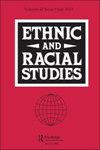Uncanny returns in settler colonial state: return, exile, and decolonization in Palestine/Israel
IF 2
2区 社会学
Q1 ETHNIC STUDIES
引用次数: 0
Abstract
ABSTRACTIn this article, I propose uncanniness as a defining characteristic of return as I explore the settler colonial context of Palestine/Israel, where return has starkly ethno-nationalistic connotations. For Palestinians, return is associated with the liberation of Palestine, while for Israelis, it is part of Zionist foundational narratives. By explicating academic research and biographical literature, I consider how the concept of uncanny can further our understanding of what it means to return in this context, and beyond. Uncanniness brings attention to feelings of disorientation, strangeness, and not-at-homeness, and by approaching return as uncanny, I suggest, it is possible to tap into the volatility of “being-at-home” and thus unsettle exclusive and essentialist notions of belonging that define settler colonialism. Consequently, the article offers a way to consider return in a manner that gets from nostalgia to a new beginning and, in the settler colonial context of Palestine/Israel, from settler anxiety to decolonization.KEYWORDS: UncannyreturnbelongingPalestine/Israelsettler colonialismdecolonization AcknowledgementsI wish to thank the two anonymous reviewers whose feedback helped in sharpening the argument. My gratitude also to SPARG research group at Tampere University for their comments and support and to Mikko Joronen for reading and commenting on the different versions of this article.Disclosure statementNo potential conflict of interest was reported by the author(s).Statement of ethicsSee Note 1.Notes1 The quotes are from a two-month ethnographic fieldwork conducted for a doctoral dissertation (Järvi Citation2021b). At the time, ethics approval was not required by Tampere University, but a discussion on research ethics can be found in the monograph.2 In addition to the refugees displaced in 1948, there is a multi-layered Palestinian exile whose possibility to return can be as precarious. However, their return does not hold similar national sentiments of liberation as that of the 1948 refugees, whose would return to places that currently constitute the state of Israel. In this article, while discussing return in general, the focus is on the transformative force associated with the return of 1948 refugees.3 Flight from uncanniness is, to be exact, a modus operandi for everyone (see, Withy Citation2015, 96–98), as for Heidegger, it is part of the ontology of being. Here, however, I hope to underline how it defines the political reality of settler colonialism.Additional informationFundingThis work was supported by the Academy of Finland [grant number 322025] and by Kone Foundation grant.殖民国家的离奇回归:巴勒斯坦/以色列的回归、流亡和非殖民化
在这篇文章中,当我探索巴勒斯坦/以色列的定居者殖民背景时,我提出不可思议作为回归的一个定义特征,在那里回归具有明显的种族民族主义内涵。对巴勒斯坦人来说,回归与巴勒斯坦的解放有关,而对以色列人来说,这是犹太复国主义基本叙事的一部分。通过对学术研究和传记文学的阐释,我思考了“不可思议”的概念是如何让我们进一步理解“回归”在这个语境中以及在这个语境之外的意义。“不可思议”引起人们对迷失方向、陌生感和不在家的感觉的关注,我认为,通过将回归视为不可思议,有可能挖掘“在家”的波动性,从而动摇定义定居者殖民主义的排他性和本质主义的归属感概念。因此,本文提供了一种考虑回归的方式,从怀旧到新的开始,在巴勒斯坦/以色列的定居者殖民背景下,从定居者的焦虑到非殖民化。关键字:不可预测的回归巴勒斯坦/以色列定居者殖民主义非殖民化承认我要感谢两位匿名评论者,他们的反馈有助于使论点更加尖锐。我还要感谢坦佩雷大学的SPARG研究小组的评论和支持,感谢Mikko Joronen阅读和评论本文的不同版本。披露声明作者未报告潜在的利益冲突。伦理声明见注1。注1这些引文来自一篇博士论文为期两个月的民族志田野调查(Järvi Citation2021b)。当时坦佩雷大学并不要求伦理批准,但在专著中可以找到关于研究伦理的讨论除了1948年流离失所的难民外,还有一群多层次的巴勒斯坦流亡者,他们返回的可能性也同样不稳定。然而,他们的返回并不像1948年难民那样怀有民族解放的感情,1948年难民将返回目前构成以色列国的地方。在本文中,虽然讨论一般的返回,但重点是与1948年难民返回有关的变革力量确切地说,逃避不可思议是每个人的一种操作方式(见Withy Citation2015, 96-98),至于海德格尔,它是存在本体论的一部分。然而,在这里,我希望强调它如何定义定居者殖民主义的政治现实。本研究得到了芬兰科学院[资助号322025]和通力基金会的资助。
本文章由计算机程序翻译,如有差异,请以英文原文为准。
求助全文
约1分钟内获得全文
求助全文
来源期刊

Ethnic and Racial Studies
Multiple-
CiteScore
4.60
自引率
8.00%
发文量
258
期刊介绍:
Race, ethnicity and nationalism are at the heart of many of the major social and political issues in the present global environment. New antagonisms have emerged which require a rethinking of traditional theoretical and empirical perspectives. Ethnic and Racial Studies, published ten times a year, is the leading journal for the analysis of these issues throughout the world. The journal provides an interdisciplinary academic forum for the presentation of research and theoretical analysis, drawing on sociology, social policy, anthropology, political science, economics, geography, international relations, history, social psychology and cultural studies.
 求助内容:
求助内容: 应助结果提醒方式:
应助结果提醒方式:


